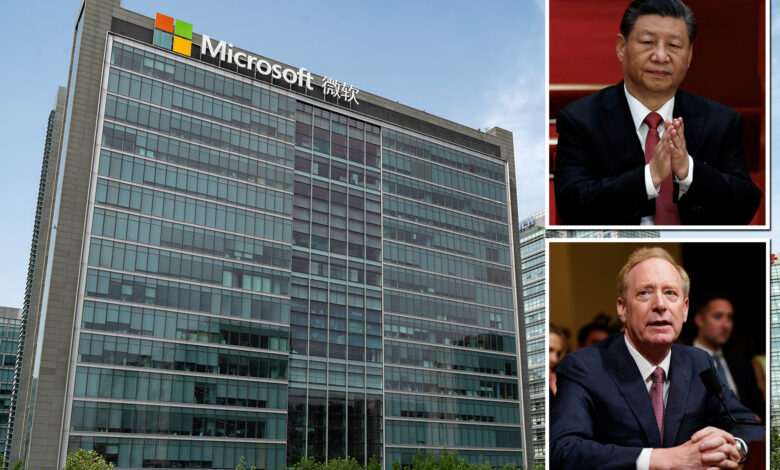China poised to embed ‘Communist Party spies’ inside US firms — including Microsoft, critics warn

China’s government has positioned itself to embed “Communist Party spies” at Microsoft and other US companies that do business in the country – and further expose them to theft of trade secrets, employee poaching and even scary intimidation tactics, The Post has learned.
A new version of Beijing’s “company law” that took effect July 1 — a clampdown that has seen scant coverage in the Western press, according to experts — requires multinational firms with more than 300 workers in the country to appoint an “employee representative” to their China affiliate’s board of directors.
Sources tell The Post that the “representatives” are almost certain to be in regular contact with Chinese authorities – if not outright members of the Chinese Communist Party. That, in turn, would give Beijing a direct line into the sensitive internal workings of American firms.
The new rules, which can alternatively require that companies adopt a local supervisory board for workers, could also give the CCP frightening tools to exert control over US companies’ employees, according to US officials.
“They can tell a [Chinese intelligence] agent, ‘This is the person you need to talk to. If you want to coerce them, here’s who they are,’” a House aide briefed on the law told The Post. “’I have access to employee data. This is their wife. This is where they live. This is where the kid goes to school.’”
Corporate spies for Beijing could likewise seek to infiltrate confidential meetings or even facilitate intellectual property theft by telling an employee to put a flash drive into a particular computer, said the House aide, who asked not to be identified.
Directors spying for the CCP could gain dangerous knowledge of a company’s “pressure points” should the authorities wish to exploit them, the source said.
The new laws also include stricter “registered capital” requirements for company executives and greater liability for officers in cases of misconduct or negligence.
It’s the latest effort by President Xi Jinping’s government to exert more control over foreign businesses, according to Paul Rosenzweig, a former Homeland Security deputy assistant secretary.
“In the past, they’ve done so in ways that I would characterize as external — that is, government acting upon a corporation,” said Rosenzweig. “Now they’re adding an internal control, an employee representative. If you wanted to be ungenerous, you could call him a Communist Party spy.”
While China’s corporate law overhaul applies to many companies, Microsoft has been in the spotlight — not only because of it has more than 10,000 employees working there, but also because its software is deeply embedded in America’s critical infrastructure.
Last year, a China-based group brazenly hacked the Microsoft email accounts of Commerce Secretary Gina Raimondo and several other US officials.
Microsoft, which declined to comment for this article, has expanded operations in China even as other Big Tech firms like Google and Meta have dialed down their presence in the region. The company has sought to downplay China-related security concerns.
When asked by Rep. Carlos Gimenez (R-Fla.) in June if the company follows a 2017 law requiring companies to cooperate with the CCP’s intelligence services, Microsoft executive Brad Smith said no – and hinted that the company was somehow exempt.
“There are two types of countries in the world. Those that apply every law they enact, and those who enact certain laws but don’t always apply them. And in this context, China, and that law, is in the second category,” Smith said.
Gimenez was unconvinced by Smith’s explanation – and told The Post that he is particularly concerned about China’s revised company law.
“Sooner rather than later, all of these corporations are going to find that they’re going to be absorbed into the CCP and into China,” Gimenez said. “The sooner they start to extricate themselves from China, the better they’re going to be, but also the better America is going to be.”
As The Post has reported, US lawmakers have warned Microsoft that its cozy relationship with China poses a national security risk – especially as the company pursues advanced artificial intelligence.
Microsoft has reportedly considered shutting down a pair of AI labs in China over perceived risks – including concerns that China could hack the facilities, steal sensitive technology or poach key employees to build its own rival firms.
The corporate law is one method through which China “could put pressure on them to keep the AI lab,” according to the House aide.
“More realistically, they’re not going to do that. What they’re going to do is just steal all the data, every single bit of data,” the aide added.
Rep. John Moolenaar (R-Mich.), chairman of House Select Committee on China, said in a statement that there is “no such thing as a private company in China.”
“I caution all Americans conducting business in China – the Chinese Communist Party will settle for nothing less than complete control at your expense,” Moolenaar added. “‘Worker representatives’ are a blatant attempt by the CCP to embed Party officials in U.S. companies.”
Sen. Marsha Blackburn (R-Tenn.) said Congress has “long known that Beijing will steal confidential business information and technology from companies operating in China.”
“Beijing’s latest move which will likely embed CCP officials further into companies shows how far the government’s grasp extends,” Blackburn told The Post.
The board representative clause is “certainly another risk factor” for Western firms, according to Jonathan Bench, an expert on Chinese corporate law and partner at Harris Sliwoski.
“I absolutely expect CCP members to be chosen by ‘democratic election’ in which employees vote,” Bench said. “And where a CCP member is not directly chosen, the designated employee representative will certainly be reporting in detail to one or more CCP cadres inside or outside the company – or both.”
It’s unlikely that Microsoft or other firms like it will be able to dodge the law, according to Bench.
“I do not see any way around this legal requirement,” Bench added.
Some experts argue concerns about China’s corporate law shakeup are overblown.
Adam Channer, a lawyer at Kirton McConkie with expertise in international investment, said the employee director rule would be a “clumsy tool” to enable CCP oversight of western businesses – and noted the law, as written, does not require the director to be a CCP member.
The bigger issue, according to Derek Scissors, chief economist of the China Beige Book, is that the US firms like Microsoft have “voluntarily subjected themselves to a completely warped and discriminatory market.”
“The company law will be interpreted in whatever way the CCP deems fit at the time, so none of the revisions matter,” said Scissors.




